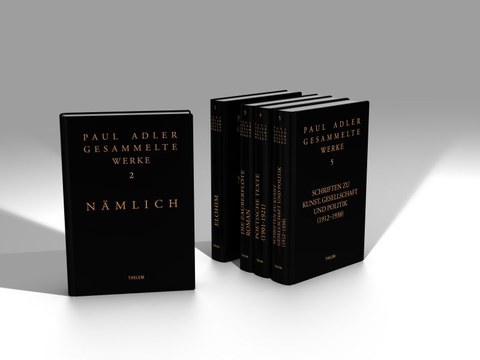Paul Adler
COLLECTED WORKS
in five volumes
Edited by Annette Teufel
This edition presents all of Paul Adler's surviving poetic texts and a representative selection of his journalistic texts in five individual volumes. It not only makes the texts, which have been out of print for a long time, available again at last, but also makes them visible for the first time in the context of a complete oeuvre that is densely interwoven in terms of themes and motifs and comments on and illuminates each other in a variety of ways.
Volume 1
Elohim
Volume 2
Namely.
Dresden: Thelem 2017.
Further information can be found here.
Volume 3
The magic flute. novel
i.V. for 2021.
Volume 4
Poetic texts (1901-1921)
Volume 5
Writings on art, society and politics (1912-1938) / Chronicle
PAUL ADLER (1878-1946), born in Prague and with a doctorate in law, had "no profession, only his vocation [...] A free man and poet." (Franz Kafka)
From the age of 23, Adler had rejected the most important organizing principle of bourgeois society, the compulsion to work. A true bohemian, he wandered through Europe for almost a decade before he found a connection to the centers of expressionist subculture in Berlin, the 'capital of modernism', in 1911. The following year, this brought him to the first German garden city, Hellerau on the outskirts of Dresden - a center of art and life reform that radiated throughout Europe. It was here that Adler produced his most important poetic and essayistic writings; it was from here that he contributed to the Dresden November Revolution as a 'socialist intellectual worker', and it was here that he remained for almost two decades, until his expulsion in March 1933. Paul Adler survived the following, final years of his life - the years of the Nazi dictatorship and the Shoah - physically and mentally broken, in a hiding place near Prague.
Contemporaries regarded the German-Jewish author as the epitome of a new, world-changing poetry: Salomo Friedländer praised him as a "musician with words", and Karl Otten said in retrospect: "The dissolution of the novel into the poetic-individual has reached its first climax here and anticipates the attempts of 'analytical modernism' (James Joyce, Italo Sveno, Jean-Paul Sartre and Samuel Beckett) in all the prerequisites and consequences of today's existence."

